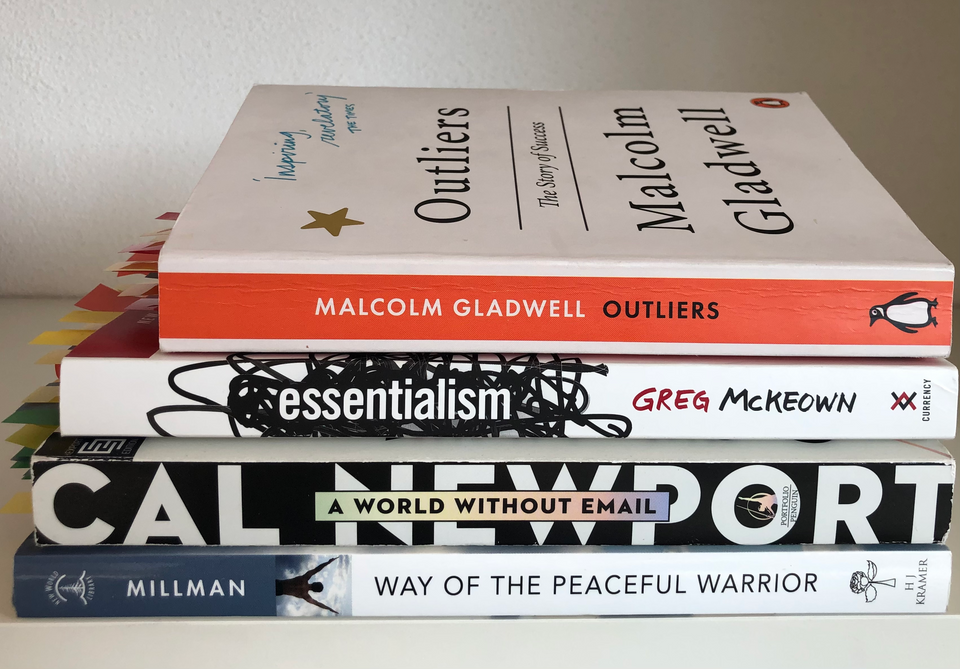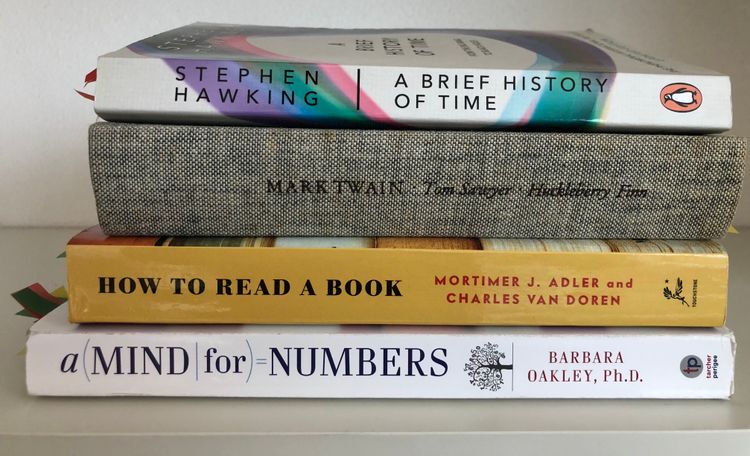April's reads

Cal Newport, Greg McKeown, Dan Millman, Malcolm Gladwell
April began with typical — if we dare to use this word given the current circumstances — April weather. Some sun, some rain, a little bit of snow. Thankfully, we readers are flexible: If it rains or snows, we read beside the warm fireplace; if the Sun sends her greetings, we relax with a book in the gardens. Reading good works inside or outside can distract us from our hectic lives. With all the many — mostly nonessential — demands on our time, we need such refugees to regain clarity. It’s, therefore, no wonder that books dealing with the ideas of doing less but better resonate with us. I had the chance to read two best-selling books on this topic this month, starting with Cal Newport’s A World Without Email.
A World Without Email, by Cal Newport
With this book, I have now read all books by Cal Newport. By education, he’s a professor of Computer Science and thus well equipped to deal with the topic of constant availability and busyness. In his newest book, he explores how the invention of first the email and, later, instant messaging tools have initially been embraced with open arms. After all, they are not successful and widely used because they exist, but because they solve(d) real problems.
As an example, consider offices from the 70s and 80s. At these times, communicating with coworkers from another room, department, or even different countries was complicated. You had two options: sending mail, which is a slow and asynchronous communication or connecting via telephone, which is fast and synchronous but cumbersome to set up, especially across different time zones. The introduction of the email thus solved the fundamental problem of conveying ideas over large distances.
However, as Cal Newport shows, the email boom also led to people discussing more because it was dead easy to use. A second fact was that there were no policies regarding the usage of emails. Today, this is still often the case. Without explicit guidelines, we adopt a style of convenience and do whatever works best now, which might not be the best solution looking forward.
In the first part of the book, author Cal Newport explores the harmful effects of building a business on the idea (either conscious or unconscious) of constant multitasking and hyper-availability. He shows that this is not what humans have evolved to; squeezing complex human non-verbal interaction into words can not work. Besides, we get nothing done and are bombarded with shallow work. He also explored this situation in his bestseller Deep Work, the first book I read of him. Since then, I’ve been a fan.
In the second part, true to the structure of his previous works, Cal Newport then shows us real-world cases where professionals, individuals, and whole companies ditched the constant communication in favor of better alternatives. These alternatives cover work processes, worker specialization, official communication protocols, and managing workload.
This book is highly relevant for anybody working in a company that “celebrates” constant connection. It also blends in exceptionally well with Newport’s previous books, So Good They Can’t Ignore You, Digital Minimalism, and Deep Work.
Favorite quote:
“If [one is] not able to spend a significant time on the specialized activities on which [one’s] business [is] built, then what [is] the point of running that business?” (p. 230, adapted)
Essentialism, by Greg McKeown
In a world where we seem to have subscripted to more, more, more by default, Greg McKeown’s Essentialism comes as a much-needed antidote. The sub-heading, The Disciplined Pursuit Of Less, hints that doing more is not necessarily better. On the contrary, when we begin to spread our attention on too many things, we likely miss the essential ones.
Therefore, it’s often the case that we’re not happier by getting additional tasks done. In contrast, it’s better to have only a hand full of obligations but pursue them with our whole hearts. Here, Essentialism provides the right mindset to gradually do less of anything and more of some valuable thing.
However, it’s not merely a tool that you apply occasionally. Instead, it will become the inner guide constantly questioning you about what is truly important. Contrast this approach with what McKeown calls the Nonessentialist mindset. Such a person would attempt to tackle anything regardless of its relevance. Success might follow, but it is more an inch of progress in million ways and not a million inches in select directions. The Essentialist subscribes to the last motto, carefully exploring her options in-depth and making better-informed decisions. In other words, she paradoxically explores more choices initially, but sticks to the essential one — and thus avoids constant task hopping.
Is it not a simple antidote to chaos, complexity, and confusion to strive for less? Less dreading obligations, less unfiltered input, less menial tasks. Author Greg McKeown made the disciplined pursuit of less a thing; his book Essentialismbecame a huge bestseller.
The book was easy to read and conveyed a relaxed atmosphere. However, I found the layout to be lacking. The headings were too frequent and occasionally without proper sizing (i.e., perceived sub-headings had the same size as the main heading). This made it challenging to “orientate” within the book. But, once I got into the book’s flow, I was no longer aware of the inconsistencies and enjoyed a calm and value-oriented take on a fascinating way of living.
Favorite quote:
“[O]nly once you give yourself permission to stop trying to do it all, to stop saying yes to everyone, can you make your highest contribution towards the things that really matter.” (p.4)
Way Of The Peaceful Warrior, by Dan Millman
This book has been on my list for a long time. I remember writing it inside the cover of a notebook that I used two-ish years ago. Part of the difficulty was getting my hands on a copy; after I found a friendly local book store, the book was my only 48 hours later. Of course, I might have ordered it online, on eBay or Amazon, but the wait is part of the enjoyment.
In Way Of The Peaceful Warrior, gymnast Dan Millman tells the story of his college years, when he met a name he just called Socrates. The book has a mythical touch, and while this character has existed, I am not sure where Socrates left and where fantasy took over. However, this question must not concern us; if there’s a pinch of narrative art, it’s only for good.
The book’s story can be summarized very briefly: By happenchance, Dan meets Socrates, who teaches him to be more. As a result, Dan becomes more, changing his diet, his view on living, and his general behavior. In one way or another, such adventures have happened countless times throughout history where one person had a life-changing encounter.
What makes Millman’s story unique is the mysterious touch he adds. For example, Socrates is portrayed as having higher powers, but this is never stated explicitly; it might only be so in Dan’s perception. Further, there’s Joy, a woman who became his wife, as Millman writes in the acknowledgments. This woman seems to have special abilities, such as re-appearing from nowhere.
This book was a bit bland initially, but I became comfortable with it. Then, the story was entertaining (I devoured it in under three days) and full of thought. It has hundreds of passages that serve as excellent quotes. Lastly, it simply is a relevant reminder of how to live in this troublesome world.
Favorite quote
“Proper posture is a way of blending with gravity […]. Proper attitude is a way of blending with life.” (p. 112, adapted)
Outliers, by Malcolm Gladwell
Malcolm Gladwell’s Outliers is fascinating; the storytelling is excellent and highly informative. He writes with seamless ease and calmness that I just got sucked into the narrative. Drawing examples from Bill Gates, Hockey players, 150-and-over IQ people, and other illuminating stories, Gladwell explores how people become outliers. While one’s abilities undoubtedly play a role, their effect is over-emphasized, as he discovers.
Over the book, Gladwell uncovers that countless influences have a say in our becoming. Take education, for example. First, all pupils are scoring relatively similar, with expected small advantages for the ones from the middle class. Sadly, the education system is set to widen the tiny initial gap drastically. Pupils that seem to have a knack for a particular subject (math, commonly) are further supported to pursue this domain. This circumstance slightly increases the initial differences. Next, because the well-scorer have received more and better education, they score better, and they are accepted to further advanced studies.
Now, the small gap has already widened. The demotivating aspect is not that these children are naturally better but that their classmates have not received the same opportunities. The slight advantages accumulate over the years.
The previous example only shone a light on education, but further critical factors exist. As becomes evident from Gladwell’s masterful opening, the environment one grows up in is equally influential, as is the birth date, contacts, or practice time. Gladwell weaves these tiny distinctions into a red thread that runs through the book.
This extraordinary work taught me an awful lot about achieving success and seeing it not just as the result of hard work but also as the product of a series of (lucky) opportunities taken.
Favorite quote:
“A basketball player only has to be tall enough — and the same is true of intelligence. Intelligence has a threshold.” (p. 90)



